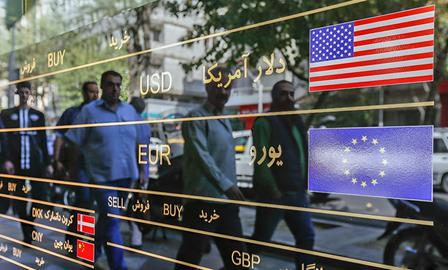Iranian-American entrepreneurs and investors – about 400 of whom met this past weekend at the fifth annual Persian Tech Entrepreneurs (PTE) conference in San Francisco – are failing to match the enthusiasm of their Western counterparts for Iran’s much-hyped startup scene. IranWire spoke to several PTE attendees who warned that recent interest in Iran’s anticipated economic opening up to the West is being undermined by an immature startup culture, legal shortcomings — as well as the arrests of visiting Iranian-American businesspeople, including Siamak Namazi.
The PTE panels – on female company founders, venture capital funding, and the challenges faced by startups – hardly even touched on Iran. The conference name, with its choice of “Persian” over “Iranian”, illustrated its focus on the Iranian diaspora rather than professionals inside the country. Organizers said they wanted to serve a “new generation” of Iranian-Americans working in Silicon Valley.
Shobeir Shobeiri, a tech entrepreneur and executive at the smartwatch manufacturer Pebble, who co-founded PTE with friend and colleague Julia Rasooly, said in his introductory address that PTE was created for Iranian-Americans who are “branching out from traditional diaspora professions” such as medicine or engineering. And Tara Kangarlou, an Al Jazeera journalist and the host of the conference, said that PTE was “about empowering risk-taking” in a community that has traditionally favoured “safe” career choices.
Anousheh Ansari, the Iran-born engineer and founder of Telecom Technologies and the Ansari X Prize, who participated in a flight to the International Space Station in 2006, gave a keynote address in which she called on young Iranian-Americans to use their imaginations when choosing their work. Ansari said that she had always wanted to go into space. “By the time I grow up,” she said, remembering her childhood sentiments, “I’ll be Mrs Spock.”
Ansari added that today’s work environment was still difficult for female professionals. “Women have to prove themselves over and over again,” she said, saying that such prejudices dogged her even at the height of her success.
Parisa Khosravi, a journalist with reporting experience from around the world, and until recently a senior vice president at CNN, gave practical advice to the conference on how to build a team. “Know their strengths, build on their strengths, and play to their strengths,” she said.
PTE attendees were also keen to pass on advice for entrepreneurs – whether in the United States or in Iran. Pejman Nowzad, a founding Managing Partner at PejmanMar Ventures in Palo Alto, said that his firm only looked for entrepreneurs trying to solve “real problems” in the world. “The biggest mistake of entrepreneurs is chasing an idea,” he said. The motivations of a startup’s founders and the chemistry of its leadership team were also important, he added.
Nowzad also had words of hope for entrepreneurs inside Iran. “We can’t touch” the country, he said, but he also pointed out that the highest number of PhD candidate entries at Stanford every year are graduates of Iran’s Sharif Technical University. He hoped that, within five to 10 years, one or more startups would emerge from Iran with “global solutions” for major problems rather than just copycat products of Western tech companies. And Nowzad was full of praise for the PTE conference. “These one-hour talks seem like just a talk,” he said, “but they can be life-changing” for young professionals looking for a push.
A number of young Iranian-Americans – both professionals and students – said that they were looking for ways to start businesses in Iran. One student, speaking on condition of anonymity because he planned to travel to the country, said that he was looking for a “targeted approach” to Iran’s needs and was asking himself “what can I do?” in his homeland.
But remarks by one observer, the lawyer and sanctions expert Erich Ferrari, of Ferrari & Associates in Washington DC, warned the conference that anyone thinking of investing in Iran needed to be careful. “The Iran nuclear deal takes us back to 2010,” Ferrari said, referring to US sanctions against Iran. The reality, he explained, was that the Treasury Department will still impose restrictions on US citizens and businesses going into the country. “The broad prohibitions won’t change,” he said. The US Congress “didn’t want the nuclear deal in the first place ... and they will be calling in the scalps” of anyone caught on the wrong side of the new regulations.
The most forbidding look at the situation for Iranian-Americans thinking of going into Iran came from one investor whose upcoming visit to the country meant that his analysis was offered on condition of anonymity. “We have a passion for Iran,” he said, referring to the diaspora community. But “the ecosystem in Iran is not there yet.” Specific problems included the rule of law – which was “lacking,” the investor explained – as well as a complete absence of trademark enforcement. “Nobody is going to go in as an entrepreneur if they can’t protect their ideas and investments,” he said. “It’s a question mark.”
Iran’s poor investment infrastructure was only the beginning of the problems in this investor’s view. Basic issues of safety for visiting Iranian-American businesspeople were causing a crisis of confidence among anyone who may have been considering a visit and possible future investments. The October arrest of Siamak Namazi, the Dubai-based Iranian-American businessman and outspoken critic of the US sanctions regime, as well a consultant for energy firms thinking of setting up in Iran, had rattled businesspeople in the Iranian diaspora.
The investor said that it was “crucial to create a stable environment” in Iran. The government had to “take the fear out” of the situation. “We love the people of Iran – we want to help. But our hands are tied. The government has a major responsibility ... If the objective is to scare, it’s working; if it’s to build the economy, it’s not.”
Related articles:
The Face of Change: An Iranian Entrepreneur Speaks
visit the accountability section
In this section of Iran Wire, you can contact the officials and launch your campaign for various problems























comments